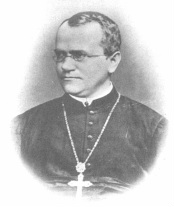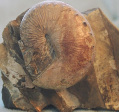Objections to Darwin's Idea of Natural Selection...

Image 14 (Gregor Mendel)
There were some aspects which were uttered against Darwinian Natural Selection:
A very vital problem in the theory of Natural Selection was Darwin's inability to explain the mechanism of inheritance. Reading the four principles of Natural Selection from today's perspective, it is quite easy to comprehend. But that is because we know about genetics and can apply that knowledge on Darwin's theory. The evolutionary biologist himself, though, was not able to do so. To actually work, Natural Selection needs inherited characteristics to be discrete. That way they can be acted upon Natural Selection and also passed completely to the next generation.
The father of "modern genetics" was a Moravian monk named Gregor Mendel (1822 - 1884). Mendel's experiments with pea plants provided first mathematical evidence that the inherited characters indeed are discrete. Unfortunately, his work was not accepted during his lifetime but only rediscovered in the early 20th century. Thus, we see that Darwin and Mendel actually were contemporaries but without any mutual influence. Darwin's theory probably would have benefitted a great deal from the monk's discoveries. However, we do not know and also cannot speculate if the acceptance of Darwin's assumption would have turned out differently if the evolutionary biologist had known about Mendel's discoveries.
A very vital problem in the theory of Natural Selection was Darwin's inability to explain the mechanism of inheritance. Reading the four principles of Natural Selection from today's perspective, it is quite easy to comprehend. But that is because we know about genetics and can apply that knowledge on Darwin's theory. The evolutionary biologist himself, though, was not able to do so. To actually work, Natural Selection needs inherited characteristics to be discrete. That way they can be acted upon Natural Selection and also passed completely to the next generation.
The father of "modern genetics" was a Moravian monk named Gregor Mendel (1822 - 1884). Mendel's experiments with pea plants provided first mathematical evidence that the inherited characters indeed are discrete. Unfortunately, his work was not accepted during his lifetime but only rediscovered in the early 20th century. Thus, we see that Darwin and Mendel actually were contemporaries but without any mutual influence. Darwin's theory probably would have benefitted a great deal from the monk's discoveries. However, we do not know and also cannot speculate if the acceptance of Darwin's assumption would have turned out differently if the evolutionary biologist had known about Mendel's discoveries.

Image 15
Another objection to Darwin's proposal was that the earth was not old enough for gradual evolutionary change to occur. While Darwin believed and postulated that evolutionary change occurred gradually, his critics did not think so. They pointed out that if this was actually the case, one should be able to see a a great number of gradually changing intermediate animal forms in the form of fossils. But we don't! However, there are very specific conditions required for fossilization to occur: First, organisms usually have to die in water. As a next step, the dead organism needs to be deposited where it can be covered quickly in mud or sand so that its bones cannot be scattered by scavengers. Then it has to lie there until its bones are turned slowly to rock by the sediment. Considering all these requirements for fossilization to happen, it should be clear that this process obviously favored fossilization to occur for aquatic organisms. The picture on the left would be an example of an aquatic organism, which belongs to the phylum Mollusca.
Moreover, paleontologists cannot find all of the fossils deposited somewhere on the earth. This is why the fossils record definitely is incomplete, another critique uttered against Darwin's ideas. It is estimated that the fossil species so far identified represent only 0.001% of all the species that have ever existed.
Moreover, paleontologists cannot find all of the fossils deposited somewhere on the earth. This is why the fossils record definitely is incomplete, another critique uttered against Darwin's ideas. It is estimated that the fossil species so far identified represent only 0.001% of all the species that have ever existed.
As one can see, Darwin had to struggle with some problems concerning his evolutionary theory of Natural Selection. It is safe to say that the scientist himself was aware of these weaknesses. This is part of the reason why he hold off for so long before he finally published his ideas in Origin of Species. However, in the next section Darwin's Impact, you will notice that Darwin, although he was lacking some important evidence, had made stunning discoveries and had drawn conclusions that turned out to be correct when Darwin was already dead.
